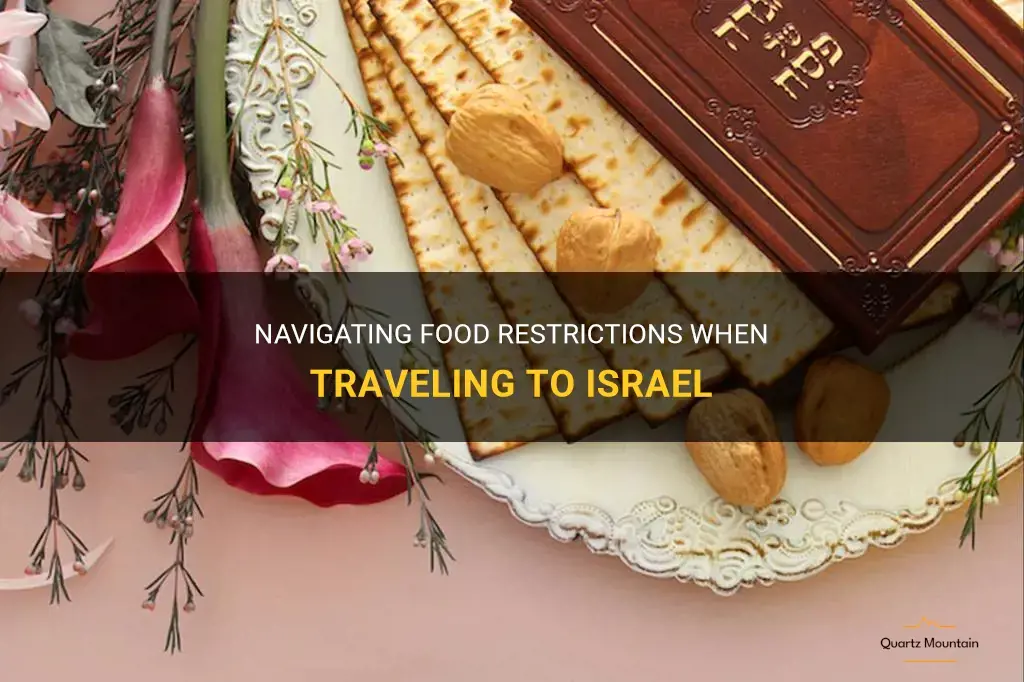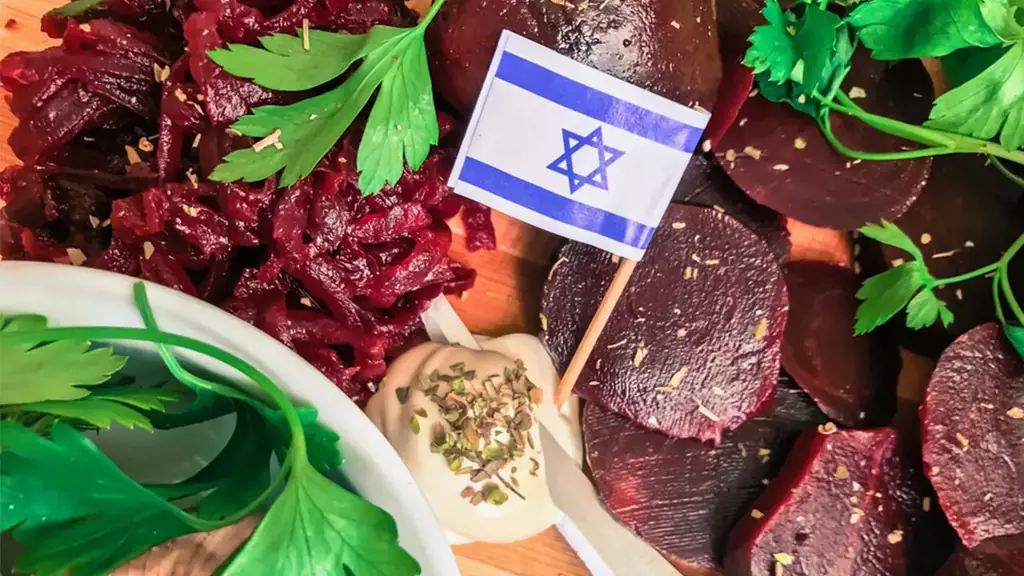
Israel is a land rich in history, culture, and of course, delicious food. However, for travelers with dietary restrictions, exploring cuisine in a new country can be challenging. Whether you're vegetarian, vegan, gluten-free, or have other dietary requirements, navigating the Israeli food scene can feel like a daunting task. But fear not! Israel is a country that embraces diversity, and as such, it has plenty of options and adaptations to cater to various dietary needs. In this article, we will explore the vibrant and diverse world of Israeli cuisine, and how you can savor every bite while adhering to your food restrictions.
What You'll Learn
- What are the common food restrictions for travel to Israel?
- Are there any specific dietary restrictions for kosher travelers in Israel?
- How do travelers with food allergies or intolerances manage their restrictions in Israel?
- Are there any specific cultural or religious food restrictions that tourists should be aware of in Israel?
- Are there any local delicacies or dishes in Israel that travelers with specific food restrictions can enjoy?

What are the common food restrictions for travel to Israel?

When traveling to Israel, it's important to be aware of any food restrictions that may apply. Israel has a diverse culinary scene, influenced by various cultures and dietary practices. Here are some common food restrictions that you may encounter when traveling to Israel:
- Kosher Food: One of the most common food restrictions in Israel is kosher food. Kosher, according to Jewish dietary laws, refers to food that is prepared and eaten in accordance with these laws. This includes the separation of meat and dairy products, certain forbidden animals, and specific preparation methods. If you are traveling to Israel and want to ensure that the food you eat is kosher, look for the kosher certification symbol on food packages or eat at certified kosher restaurants.
- Halal Food: Halal is the dietary standard in Islam, and many restaurants in Israel offer halal options. Halal food follows specific guidelines, such as the method of slaughtering animals and the absence of certain ingredients. Look for halal certification or ask the restaurant staff for halal options if you adhere to these dietary restrictions.
- Vegetarian and Vegan Food: Israel is known for its vibrant vegetarian and vegan food scene. Many restaurants and food stalls offer vegetarian and vegan options, catering to the growing demand for plant-based diets. You can find a variety of delicious dishes made with fresh vegetables, legumes, and grains. Some popular vegetarian and vegan dishes in Israel include falafel, hummus, sabich, and shakshuka.
- Gluten-Free Food: If you have gluten sensitivity or celiac disease, you can find gluten-free options in Israel. Many supermarkets and health food stores offer gluten-free products, and some restaurants have gluten-free menus. However, it's always a good idea to inform the restaurant staff about your dietary restrictions to ensure that your food is prepared in a gluten-free environment.
- Allergies and Intolerances: If you have any allergies or intolerances, it's important to communicate them to the restaurant staff or food vendors. Common allergens such as nuts, dairy, eggs, and seafood are used in various dishes, so it's crucial to ask about potential cross-contamination or hidden ingredients. In most cases, chefs and restaurant staff will be accommodating and make the necessary modifications to ensure your safety.
- Non-Kosher Foods: While kosher food is widely available in Israel, non-kosher options can also be found. Many restaurants, especially in tourist areas or non-Jewish neighborhoods, serve non-kosher food. However, if you are strictly observing kosher dietary laws, it's important to double-check the kosher certification before eating.
- Traditional Jewish Dietary Laws: In addition to kosher laws, some more traditional Jewish individuals may follow additional dietary restrictions, known as "mehadrin" or "chumra." These restrictions can include avoiding certain ingredients or specific cooking practices. If you are visiting a home or eating at a restaurant owned by more observant Jews, it's always best to inquire about any additional dietary guidelines they may follow.
It's important to note that while these food restrictions exist, Israel also offers a wide variety of international cuisines, including Italian, Asian, and American. If you have specific dietary needs or restrictions, it's advisable to research and plan ahead to ensure a smooth dining experience during your travels in Israel.
Breaking Down Turkey's Travel Restrictions Amidst the COVID-19 Pandemic
You may want to see also

Are there any specific dietary restrictions for kosher travelers in Israel?

Israel is known for its rich culinary scene, with influences from various cultures. For Jewish travelers, especially those who adhere to kosher dietary laws, it is important to know the specific restrictions and guidelines when it comes to food.
Kosher food refers to food that is prepared and consumed according to Jewish dietary laws. These laws are derived from the Torah and are followed by observant Jews as a way to maintain a spiritual and ethical connection to God.
In Israel, finding kosher food is relatively easy, as the country is home to a large Jewish population. Kosher restaurants and food products can be found throughout the country, especially in major cities like Jerusalem and Tel Aviv.
When it comes to dining out, kosher travelers should look for restaurants that have a kosher certification. This certification, which is often displayed prominently, ensures that the establishment adheres to the strict guidelines of kosher food preparation. It is important to note that not all kosher restaurants serve the same level of kosher food. Some may strictly follow all the dietary laws, including separate dishes and utensils for meat and dairy, while others may have a more lenient approach.
In addition to kosher restaurants, kosher travelers can also find kosher food in supermarkets and grocery stores. Look for products that have a kosher certification symbol, such as a "K" or the word "kosher" written in Hebrew. This ensures that the food has been prepared according to Jewish dietary laws.
It is also worth noting that not all foods are automatically kosher, even if they do not contain pork or shellfish. For example, certain ingredients, such as gelatin or some food additives, may be derived from non-kosher sources. Kosher travelers should therefore be cautious when consuming processed or packaged foods and always look for the kosher certification symbol.
When traveling to remote or less populated areas in Israel, finding kosher food options may be more challenging. In these cases, it is advisable to bring your own kosher food or consult with local Jewish communities for recommendations.
If staying at a hotel in Israel, it is recommended to choose a hotel that offers kosher dining options. Many hotels in major tourist destinations have kosher kitchens and dining rooms to cater to the needs of kosher travelers.
Overall, kosher travelers in Israel have plenty of options when it comes to finding kosher food. From kosher restaurants to certified food products in supermarkets, there are numerous choices available. By being aware of the specific dietary restrictions and guidelines, kosher travelers can enjoy their time in Israel while maintaining their kosher lifestyle.
Navigating the Implications of Civilian Travel Restrictions: What You Need to Know
You may want to see also

How do travelers with food allergies or intolerances manage their restrictions in Israel?

Traveling can be an exciting and enriching experience, but for individuals with food allergies or intolerances, it can also be a source of stress and concern. With unfamiliar cuisines and language barriers, managing dietary restrictions can seem challenging. However, in Israel, a country known for its diverse and innovative culinary scene, there are various options and resources available to help travelers with food allergies or intolerances enjoy their trip while staying safe and healthy.
One of the first steps in managing dietary restrictions while traveling in Israel is to do thorough research and planning before the trip. Understanding the local cuisine and common ingredients can help travelers make informed choices and communicate their needs effectively. Israeli cuisine is heavily influenced by Mediterranean and Middle Eastern flavors, with a variety of dishes centered around fresh fruits, vegetables, grains, and legumes. Traditional dishes like hummus, falafel, and grilled meats are often gluten-free, vegetarian, or vegan-friendly. However, it's important to be cautious and aware that allergen-containing ingredients, such as nuts, sesame, and dairy products, are commonly used in many dishes.
In larger cities like Tel Aviv and Jerusalem, there is a growing awareness and accommodation for food allergies and intolerances in restaurants and cafes. Many establishments have gluten-free, dairy-free, and nut-free options clearly indicated on their menus or offer staff trained to assist with dietary restrictions. It's advisable to contact restaurants in advance to inquire about their allergy policies or to ask for specific modifications to dishes. Maintaining open communication with restaurant staff and chefs can ensure a safe and enjoyable dining experience.
For individuals with severe allergies or specific dietary needs, it's recommended to bring a supply of safe and familiar snacks from home. This can be especially useful on day trips or in areas with limited dining options. Additionally, packing necessary medications such as antihistamines or epinephrine auto-injectors is essential for emergency situations. It's crucial for travelers to have a clear understanding of their own allergies or intolerances and their personal requirements for managing them.
Traveling with food allergies or intolerances in Israel also means being aware of local food labeling regulations. In 2018, Israel introduced new labeling laws requiring all prepackaged foods to clearly indicate the presence of major allergens. This includes ingredients like gluten, eggs, peanuts, tree nuts, soy, milk, fish, shellfish, and sesame. This labeling requirement provides travelers with greater confidence in identifying safe food options.
Another useful resource for travelers with food allergies or intolerances in Israel is the Israel Food Allergy and Anaphylaxis Network (IFAN). IFAN is a non-profit organization that offers information, support, and advocacy for individuals living with food allergies. Their website provides resources such as a local restaurant directory with allergy-friendly options, translation cards with allergy information in multiple languages, and tips for traveling with food allergies in Israel.
In conclusion, managing food allergies or intolerances while traveling in Israel requires proper planning, communication, and awareness. By researching local cuisine, contacting restaurants in advance, packing safe snacks, understanding food labeling laws, and utilizing resources like IFAN, travelers can navigate the culinary landscape of Israel while comfortably managing their dietary restrictions. With caution and preparation, individuals with food allergies or intolerances can savor the flavors of this diverse and vibrant country without compromising their health and safety.
Understanding Ulster County Travel Restrictions: What you Need to Know
You may want to see also

Are there any specific cultural or religious food restrictions that tourists should be aware of in Israel?

When traveling to a new country, it is important to familiarize yourself with the local culture and customs. One aspect of culture that may have a significant impact on your dining experience is food restrictions. In Israel, a country rich in history and diversity, there are some specific cultural and religious food restrictions that tourists should be aware of.
One of the main religious groups in Israel is Judaism, and kosher dietary laws are followed by many Jews. These laws dictate what is considered "fit" or "proper" in terms of food consumption. Kosher laws include rules about the types of animals that can be eaten, how they must be slaughtered, and the prohibition of mixing meat and dairy products. This means that certain foods, such as pork and shellfish, are not considered kosher and are not commonly found in Israeli cuisine. If you are planning to dine at a Jewish-owned or kosher-certified restaurant, you can expect to find strict adherence to these rules.
Another religious group in Israel is Islam, and Muslims follow dietary laws known as halal. Halal guidelines are similar to kosher rules in some aspects, such as the requirement for animals to be slaughtered in a specific manner. However, there are some differences, such as the permissibility of certain meats like lamb. If you are looking for halal food options, you can find restaurants and food establishments that cater to the Muslim population in Israel, particularly in cities with significant Muslim populations like Jerusalem and Jaffa.
In addition to religious food restrictions, there are also cultural food preferences that may influence the Israeli dining experience. For example, many Israelis do not consume dairy products during meat meals. This practice stems from a tradition of not mixing milk and meat, which has become customary for secular Israelis as well. If you are dining at a non-kosher restaurant, you may find that they offer separate menus for meat and dairy dishes.
It is worth noting that while these dietary restrictions and preferences exist, Israel is a multicultural society where you can find a wide variety of cuisines that cater to different tastes and dietary needs. From Middle Eastern and Mediterranean dishes to Asian and European cuisines, there is something to suit every palate in Israel.
To ensure a smooth dining experience in Israel, it is advisable for tourists to familiarize themselves with the local food customs and inquire about dietary options when dining out. If you have specific dietary restrictions or requirements, it may be helpful to communicate them to the restaurant staff ahead of time. This will help to ensure that your dining experience in Israel is enjoyable and meets your needs.
Exploring Paradise: Unveiling the Travel Restrictions to Key West
You may want to see also

Are there any local delicacies or dishes in Israel that travelers with specific food restrictions can enjoy?

When visiting Israel, travelers with specific food restrictions may be concerned about finding dishes they can enjoy. However, Israel is a diverse and multicultural country with a wide range of delicious local delicacies and dishes that cater to different dietary restrictions. Whether you are vegetarian, vegan, gluten-free, or kosher, there are plenty of options to choose from.
For travelers following a vegetarian or vegan diet, Israel offers an abundance of plant-based dishes that are packed with flavor. One popular vegetarian dish is Falafel, which consists of deep-fried balls or patties made from ground chickpeas or fava beans. It is typically served in pita bread with tahini sauce, vegetables, and pickles. Another delicious vegan option is Sabich, a sandwich made with fried eggplant slices, boiled eggs, tahini sauce, and various vegetable salads.
For those following a gluten-free diet, Israel's cuisine often relies on naturally gluten-free ingredients like rice, potatoes, and quinoa. One gluten-free dish that is a must-try is Shakshuka, a flavorful tomato and bell pepper stew that is typically served with poached eggs and crusty bread. However, you can opt for gluten-free bread or enjoy the dish on its own. Hummus is another gluten-free staple in Israeli cuisine, made from mashed chickpeas, tahini, garlic, lemon juice, and olive oil. It is perfect for dipping with fresh vegetables or gluten-free crackers.
If you're keeping a kosher diet, you'll be pleased to know that Israel has a wide range of kosher restaurants and food options available. Kosher dietary laws prohibit the consumption of certain animals and require specific preparation methods. Many restaurants in Israel are certified kosher, and you can easily identify them by the kosher symbol displayed on their windows or menus. Some popular kosher dishes you can enjoy include kosher shawarma, kosher schnitzel, and kosher schwarma.
It's also worth mentioning that Israeli cuisine is heavily influenced by Middle Eastern and Mediterranean flavors, which means there are plenty of dishes with fresh fruits, vegetables, legumes, herbs, and spices. These ingredients not only make the food delicious but also provide a wide range of health benefits.
In conclusion, travelers with specific food restrictions can still enjoy a variety of local delicacies and dishes in Israel. From vegetarian and vegan options like falafel and sabich to gluten-free dishes like shakshuka and hummus, and kosher options like kosher shawarma, there is something for everyone. So, regardless of your dietary restrictions, make sure to indulge in the diverse and flavorful Israeli cuisine during your visit.
Navigating Atlantic City Travel Restrictions: What You Need to Know
You may want to see also
Frequently asked questions
Yes, there are some food restrictions for travel to Israel. Some common food restrictions include the prohibition of pork and shellfish, as well as the separation of meat and dairy products. These restrictions are based on Jewish dietary laws, known as kashrut.
Yes, you can find a wide variety of vegetarian and vegan food options in Israel. Many restaurants and cafes offer plant-based dishes, and there are also specialized vegan and vegetarian restaurants throughout the country. Israeli cuisine often includes a lot of fresh fruits, vegetables, and legumes, making it fairly easy to find meat-free options.
Yes, there are gluten-free food options available in Israel. Many supermarkets and health food stores carry gluten-free products, and some restaurants offer gluten-free menus or can accommodate gluten-free requests. It's always a good idea to communicate your dietary restrictions to restaurant staff so they can assist you accordingly.
Yes, you are generally allowed to bring your own food into Israel, including items that adhere to your specific dietary restrictions. However, it is recommended to check with the Israeli Customs Authority for any specific regulations or restrictions regarding the importation of food items.
Yes, there are specific food restrictions during certain Jewish holidays in Israel. For example, during Passover, which commemorates the Jewish exodus from Egypt, chametz (leavened bread and grain products) is not allowed. Instead, unleavened bread called matzah is consumed. It's always a good idea to familiarize yourself with the specific food restrictions and customs associated with any Jewish holidays if you plan to visit Israel during those times.







